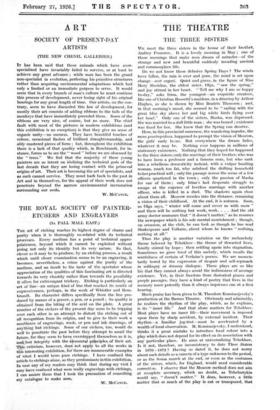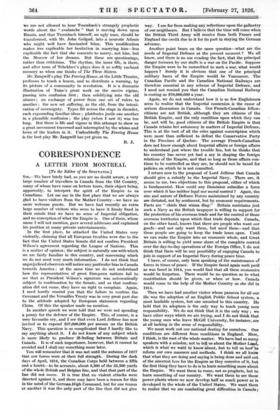THE THEATRE
THE THREE SISTERS
WE meet the three sisters in the house of their brother, Audrey Prozorov. It is a lovely morning in May ; one of
those mornings that make men dream of miracles—of the strange and new and beautiful suddenly invading ancient and commonplace life.
Do we not know those delusive Spring Days ? The winds have fallen, the rain is over and gone, the mind is set upon change (wet vagari. Quiet and grave, in the figure of Miss Mary Sheridan, the eldest sister, Olga, " saw the spring," and joy stirred in her heart. " Tell me why I am so happy to-day," asks Irina, the youngest—an exquisite creature, like one of Christina Rossetti's maidens, in a drawing by Arthur Hughes, as she is shown by Miss Beatrix Thomson ; and, in that morning's mood, she seemed to be " sailing with the great blue sky above her and big white birds flying over her head." Only one of the sisters, Masha, was depressed. She was married to a dull little man ; she was bound ; existence was fixed for her. She knew that the Spring can deceive.
Here, in this provincial sameness, the wandering impulse, the mens praetrepidans, happened to prompt the vision of Moscow, the girls' early hchne. But everywhere the dream fades, whatever it may be. Nothing ever happens in millions of stationary existences. Nothing that they hoped for happened to the three sisters ; only the marriage of their brother, who was to have been a professor and a famous man, but who sank into a rebellious domesticity instead, with a vulgar bustling woman, much too fat, who subdued the drifting household to her practical will ; only the passage across the scene of a few officers quartered in the town ; only the passion of Masha for one of them ; only Irina's last desperate struggle to escape at the expense of loveless marriage with another officer, who is killed in a duel. The shadows again close about them all. Moscow recedes into the distance, remaining a vision of their childhood. At the end, it is autumn. Soon, as Olga says, " winter will come and cover us with snow " and there will be nothing but work, work. . . . And the old army doctor murmurs that " it doesn't matter," as he resumes the newspaper which is his sole mental nourishment ; though, on occasion, at the club, he can look as though he has read Shakespeare and Voltaire, about whom he knows " nothing, nothing at all."
Thus the play is another variation on the melancholy theme beloved by Tchekhov—the theme of thwarted lives, faintly stirred by hope ; then settling again into stagnation. Sometimes we grow tired of this melody, which recalls the wistfulness of certain of Verlaine's poems. We are momen- tarily bored by the expression of despair and self-reproach in soliloquy or dreamy dialogue. These plays are so like liie that they cannot always avoid the tediousness of average existence. Yet, in their freedom from rhetorical graces and purple passages, they have a kind of poetry that lives in the memory more potently than it always impresses one at a first hearing.
Much praise has been given to M. Theodore Komisarjevsky's production at the Barnes Theatre. Obviously and admirably, he realizes the rhythm of the play, which, as he explains, is its " inner life." And that alone matters for Tchekhov. Most plays have no inner life—their movement is imposed upon them by sharp accident, by external incident. Their
rhythm—a familiar jog-trot—must be accelerated by a wealth of local observation. M. Komisarjevsky, I understand,
thinks it a great mistake to introduce local colour into a play which does not depend for its effect on its association with any particular place. He aims at universalizing Tchekhov.
Is it not, therefore, an inconsistency to date Three Sisters in 1870-1872 ? Having so dated it, he does not worry about such details as a camera of a type unknown to the period, or as the Sousa march at the end, or even as the costumes of the sisters, which, for England, would need considerable correction. I observe that the Moscow method does not aim at complete accuracy; which no doubt, as Tehebutykin would say, " doesn't matter." It does, however, a little matter that so much of the play is cut or transposed, that
we are not allowed to bear Tusenbach's strangely prophetic words about the " avalanche " that is moving down upon Russia, and that Tusenbach himself, an ugly man, should be transformed, with Mr. John Geilgud, into a neurotic Adonis who might well have fascinated Irina. This modification makes less explicable her hesitation in marrying him—less explicable the fact that she consents to marry, not him, but the Moscow of her dreams. But these are questionings, rather than criticisms. The rhythm, the inner life, is there, and after none of Tchekhov's plays does it so softly enchant memory as when one thinks of The Three Sisters.
Mr. Zangwill's play The Forcing House, at the Little Theatre, professes to teach a lesson, and to distribute a warning, by its picture of a community in revolution. It is a dramatic illustration of Taine's great work on the ancien passing into confusion first ; then solidifying into the old abuses ; an exchange of power from one set of rulers to another ; the new set suffering, as the old, from the intoxi- cation of sovereignty. Types flit across the stage in disorder, each expounding familiar ideas ; platitudes jostle one another in a plausible confusion ; the play (when I saw it) was too long. But there is life and vigour in this attempt to show us a great movement traversed and interrupted by the whims and loves of the leaders in it. Undoubtedly The Forcing House is the best play Mr. Zangwifl has yet given us.
R. J.























































 Previous page
Previous page